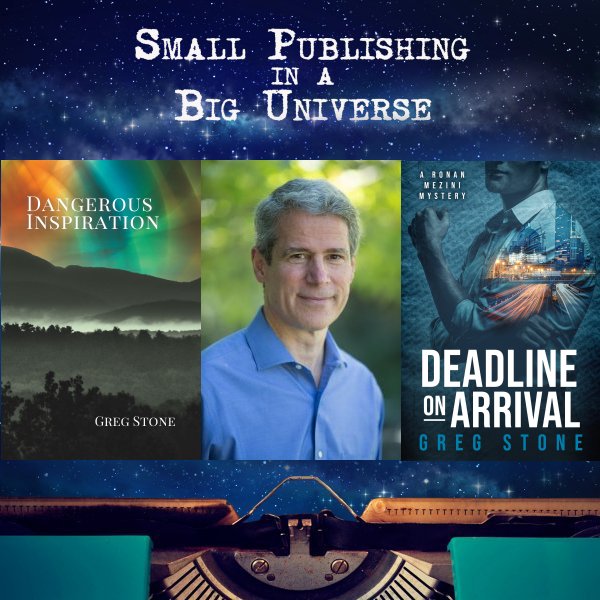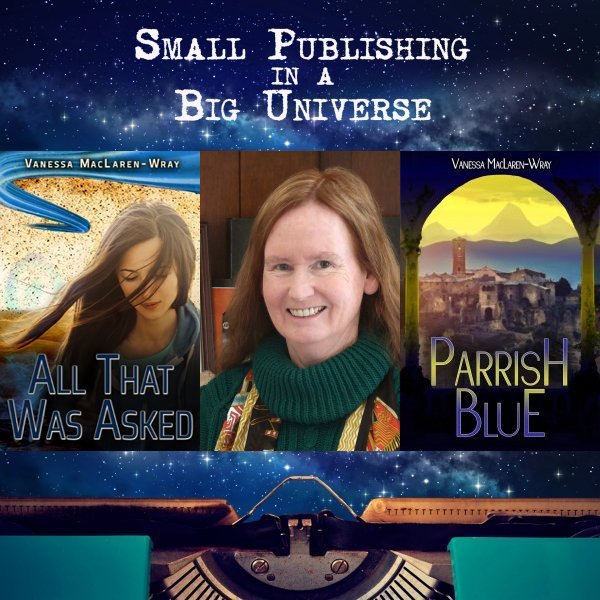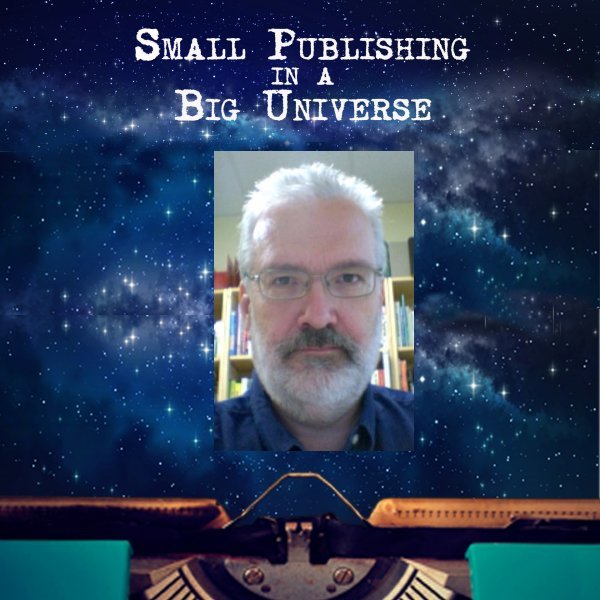[00:00:08] Speaker A: Welcome to small publishing in a big universe. I am your host, Lisa Jacob. This month, we have an interview with psychiatrist doctor Lali Pia from our sponsors. This month, Water Dragon Publishing presents two new books, the Death Bringer by J. Scott Coatsworth and Dragon Gems. The summer 2024. Dragon Gems offers a standalone novelette traveler by Andrea Montagu Paper Angel Press offers call to Valor by Gary Beckley. The thoracic cycle, book four by J. Scott Coatsworth. Ike will never be the same, and neither will his world War is coming. Ike has become the progenitor, and the seed mother has released him to transform the world for her alien brood. Celia and Raven, Ike's former friends, are the only ones who can save him and the world. But what if the cure is worse than the invasion? Raven has his own hands full keeping the dragon like Varant in line while helping Celia to save the world. But what if the only way to do so is to sacrifice Eik, the man that he loves? It's the end of the world. Or could it be the start of something new? The Deathbringer is available this month from Amazon, Barnes and Noble, Kobo, Smashwords, and other online booksellers. Or support your local independent bookstores by ordering it through bookshop.org dot. For more information, visit their
[email protected], dot.
Welcome to small publishing in a big universe, and we have with us Lally.
[00:02:04] Speaker B: Pia, the author of the book the Fortune Teller's Prophecy, a memoir of an unlikely doctor. The overriding theme is recovery from hardship and hope. A six month old child is taken by her parents to see a fortune teller in Sri Lanka. Priest tells the parents that their daughter's gonna become a doctor of doctors. When you fast forward to age 21, I'm stuck in Ghana as the family has left for a better life in California, but I'm caught in an immigration snafu. Then let's go to age 35. I'm a single mom on welfare with two daughters, working a dead end job. I'm working at UC Davis's donated body program and actually removing human heads and body parts. And that's actually where my story begins.
[00:02:50] Speaker A: Wow. How did you end up in that job?
[00:02:53] Speaker B: I just needed a job. I was a single parent. I was actually on food stamps. I needed anything that would get me some money. So first I was working with rats at UC DAVis, and I just hated killing those rats. I hated working with those. And so when this came out and it was at the medical school, I thought, great. I didn't realize that I was just one person. And I was in charge of the body program. So every day I'd, you know, lift up the coolers, see who died. And then I'd think, hmm, should we ever embalm the body for the students, or shall I take body parts off? And I was doing it all solo, so it was very awful. And I had a freezer full of body parts. Actually had labels, and I'd say heads and then ankles. And to make it not so horrible, when I gave a tour of the morgue, I'd say heads and shoulders, knees and toes. Knees. I really did.
[00:03:38] Speaker A: Doing these things inspire you to write a memoir as opposed to a fictional memoir.
[00:03:45] Speaker B: So what inspired me? Washington. Everyone I met who heard my story because it was so convoluted from continent to continent, they said, you've got to write a book. And I really wasn't a memoir writer or even interested in memoirs. But the more people who told me this, I thought, whatever. And so I basically did it. Not because I felt a calling, because I'm really into fiction. I'm really into chilling novels that are full of suspense. It was because people drove me. They said, your story is so interesting, you've got to put it down. And that's why I did it. Of course it's going to be a useful thing for my kids to listen when they grow up, because it's inspirational. It won an award for inspiring and uplifting memoirs. So I really feel that it's going to speak to a lot of people who, when they're stuck, they think, hey, I can't get out of this rut. And so I really feel like it's going to speak to people to never give up, because the last few words in the book are never, ever give up. In fact, and I just recently got a message from someone who read the book. She said that I wanted to be a librarian. And I'm thinking, how can I do that? I'm 42. Then I read your memoir, and I feel motivated. I filled out the forms. I'm going to do it. So if I reach that one person, it just makes me so happy because they realized, darn, she was 35 and on welfare. She wasn't a doctor at all.
[00:05:08] Speaker A: Have you written any novels?
[00:05:09] Speaker B: Yes, I'm currently finishing off a novel. It's about a psychiatrist. I was a psychiatrist working in a jail in Redwood City. So when you go there, you think, oh, this is where all the bad guys are. But you realize after speaking to people that you could be right here with this person. And I also thought there were so many ethical quandaries. So my next book, which is, I'd say 90% done, is about a psychiatrist in a jail. And she has to make a tough decision. Should she tell all and save an innocent man or keep quiet to keep her license and keep her livelihood. So that's how I framed it. But it's a suspension. It's nothing like my memoir right now.
[00:05:48] Speaker A: Does it have a title yet?
[00:05:49] Speaker B: I called it the meat slab. I don't know if I'll keep it. People like, oh, but, you know, there's vegetarians out there. And just editing, I found out from writing, it's never about just writing. It's about editing, editing, editing and getting people's critique and then re editing. And so I'm in the editing phase.
[00:06:06] Speaker A: Are you self published?
[00:06:08] Speaker B: I'm with publishing companies called. She writes press. They're just switching to being distributed by Simon and Schuster. But I entered a competition, and I won a publishing deal. It came with publicity. 500 books. It's been just incredible. It's worth, I guess, thousands of dollars. I didn't know that at the time, but one of the coolest things about publishing with them is that you meet with the publisher every week on a Tuesday, she has an office hour, and all of us are in the sisterhood. So I love that engagement with other people who are already there. I never knew that there was so much involved in writing a book. It's been fun. And you know what's interesting is my current day job. When I'm talking to children, I'm a child psychiatrist. You're there and you're just like this, and you don't say anything, and they're talking, and you say a few words here and there. But when you're trying to promote your book, you have to really have a new Persona. Like, when I'm in a bookstore and I'm pushing my book, I'm like, hi. You look like you're in the mood for an uplifting memoir. And I found that I'm actually pretty darn good at it because it's scary. It's such a different thing to go out there and be so open.
[00:07:14] Speaker A: Are you typically an introvert or an extrovert?
[00:07:16] Speaker B: I think I'm an extrovert. In fact, my friends say, yes, we knew you're an extrovert all along, Lally. You didn't know it. I'm always the one to go out and think, whatever. I'll put my foot in it and I'll go forward rather than being an introvert.
[00:07:27] Speaker A: But when you're writing. Since you do have a day job, what is your normal schedule like?
[00:07:33] Speaker B: So, my normal schedule is I, and I made it this way. I could make much more money if I worked every day. But I'm told very sad and terrifying stories sometimes, so it's hard to not let that get to you. So I figured I. I would do best if I could work three days a week. So I work three full days, Monday, Tuesday, Wednesday, and then the rest of the week, it's like Thanksgiving. So what does that do? Well, it allows me to write, which has been wonderful, but it allows me to truly let my mind not think about what I've just heard. Usually these are stories of sexual abuse, physical abuse, terrible. So there's one time when I decided I normally do not bring my work home. So by setting that barrier of don't bring the work home, I can actually do my job. And if you're just working nonstop, you don't have a time to just relax and get used to what you just heard. So even after doing this all these years, I think it's critical. And I can afford to have four days of off and work three days. I'm just grateful. And it's made me able to write and meet with friends and get critiqued and so on.
[00:08:36] Speaker A: It seems like before you write these things down, you need to have a certain set of distance. Like your next novel is about a psychiatrist in a prison, and you had done that, so you now you have a long distance between them. Do you think that at some point you would write something about what you're presently doing when you get some distance? Or is this just. No, I'm not going to touch this stuff.
[00:09:05] Speaker B: No. I would say that the idea for the psychiatrist in the jail story was happening when I was in the jail and actually had jotted down a lot of it. So I don't think I needed that distance, but it obviously helps you to frame things better. And I was a terrible writer. I wasn't a writer. I didn't even know the first thing about writing. This was like, six years ago. I thought, hey, what do people do when they've got a book? I know, they find an agent. So I thought, okay, what I'm going to do is my manuscript wasn't done. I had written like, 75% of it at the time. And I thought, oh, I'm going to look for agents. So I chose my dream agent, which would be a green burger, because I love that sort of thing. DaVinci code, all of that. So I thought that would be my dream agent. And then let me just pick two from the hat, because I'd heard that after you do that, then people will say, ah, if they look at it, if they even look at it, they'll say, give me a paragraph or give me a one liner. It'll take months. So I sat back, and in two months, the other two that I had applied to said, eh, I think one didn't respond and one said, no, thank you. But the dream publisher said, I think it was within three weeks. Send us the entire manuscript at your earliest convenience. And I was like, oh, my God. I didn't know what I was doing. I hadn't written it. So I went to my friend who said, oh, you can't do that. People have a book before they go to query. And so I actually said, can I have two weeks? And I went through and did crappy job. And it was so bad. Like in chapter seven, someone might say, hey, what's your name? And they knew the name in chapter one. Anyway, that's, yeah, that's how bad it was. But I sent it over, and despite that, she wrote back and said, I like your premise. We liked your characters. I mean, I can't believe it. I got a full response. Of course, they didn't say, send it right now, but they asked me to fix stuff up. But I have found since that that was a weird thing that happened. So I think now that it's fixed up, I know there's going to be an audience. If I could mess up that long ago, I can do better.
[00:10:57] Speaker A: Is there anything that you could give as an advice, other than never give up to new writers?
[00:11:03] Speaker B: Yeah, I would say spread your net wide, first of all. But before you even do that, that when I got into this, like I said, I've been doing medical school, so I didn't have a chance to find out. Is this garbage? So my first bit of advice is for people to join a book club. I found one on meetup. I said, hey. And then I thought, there's this many people who love what they do. And they were telling me, oh, that's a gerund. That's a this. And so you get so much critique and so many suggestions for how to improve your work. So it helps you develop a thick skin, because when you write, it's so tender. It's like showing people your underwear. It's so sensitive. And then as people say, no, I don't like this, or I like this. You start realizing, you can take it, you can take it. And then you also find that in that group, I had a group of twelve people that some of the people in there are very, very, I mean, love what you write, and some of the others think that's awful. So in a way, you realize I have an audience that's specific. Even in this group of twelve. Some people may like or hate the same thing. So I went through that sort of process, and that helped me, and I did that for years. And I was shaking the days I was presenting, like, what will they say about my work? But then as time went on, I got more and more. That's nice, that's nice. And I didn't have real critique, so I workshopped my book at a full manuscript reading. And when I did that, you get a single author and other people read the entire manuscript and critique it. And then the finishing touches on being a writer for me was I hired a book coach and she was awesome because she said, okay, this sounds all good, lally, but where's the light in this scene? Because she was seeing it as someone who wrote plays and needed to see where was the light source? Or she'd say, you know what? You've written dialogue for three paragraphs. What's happening? No one moved. I'm thinking, oop, that's right, no one moved. She said, you got to have something happen. It was really cool to get that kind of feedback. So I found this all fun. It's really been fun learning, get critique, lots of it.
[00:13:03] Speaker A: Where can people contact you?
[00:13:05] Speaker B: They can go on my website that's got all the links. I've also got an audiobook. My website is lallipeer.com dot.
[00:13:13] Speaker A: Thank you very much for your time.
[00:13:15] Speaker B: Thank you very much.
[00:13:23] Speaker A: New from Water Dragon Dragon Gems Summer 2024, a fairy godmother has to opt for a career change, and there are more than just cats in that bodega. Speaking of cats, one wants to be king of cats, but has to drag his crafty chamberlain in with him. What do you do when space pirates board your luxury liner? And of course, in this collection of original stories, there's dragons. Dragon Gems Summer 2024 is available this month from Amazon, Barnes and Noble, Kobo, Smashwords, and other online booksellers. Or support your local independent bookstores by ordering it through bookshop.org dot. For more information, visit their
[email protected].
thanks again to our guest doctor Lali Pia. We plan on publishing another episode around the third Wednesday of every month. Watch for episodes around that time. If you want to know more about small publishing in a big universe. Visit our website at spbu dash podcast.com and subscribe to our newsletter. Send us your feedback by using the contact us link. Like us on Facebook Spbupodcast. Contact us on XPU Underlinepodcast. To find out more about the books and other products featured during this episode, please visit the SPBU Marketplace at SPBu dash marketplace.com. this podcast was recorded and edited by yours truly. Lisa Jacob executive producer is Stephen Radecki. Theme and ad music is provided by Melody Loops. Enhanced transcription services are provided by Lisa Jacob. This month's episode was sponsored by Water Dragon Publishing and paper Angel Press. You can listen to our podcast on Apple Podcasts, Spotify, Amazon Music, and most of your favorite podcast services. Thank you very much for listening and talk to you soon.


